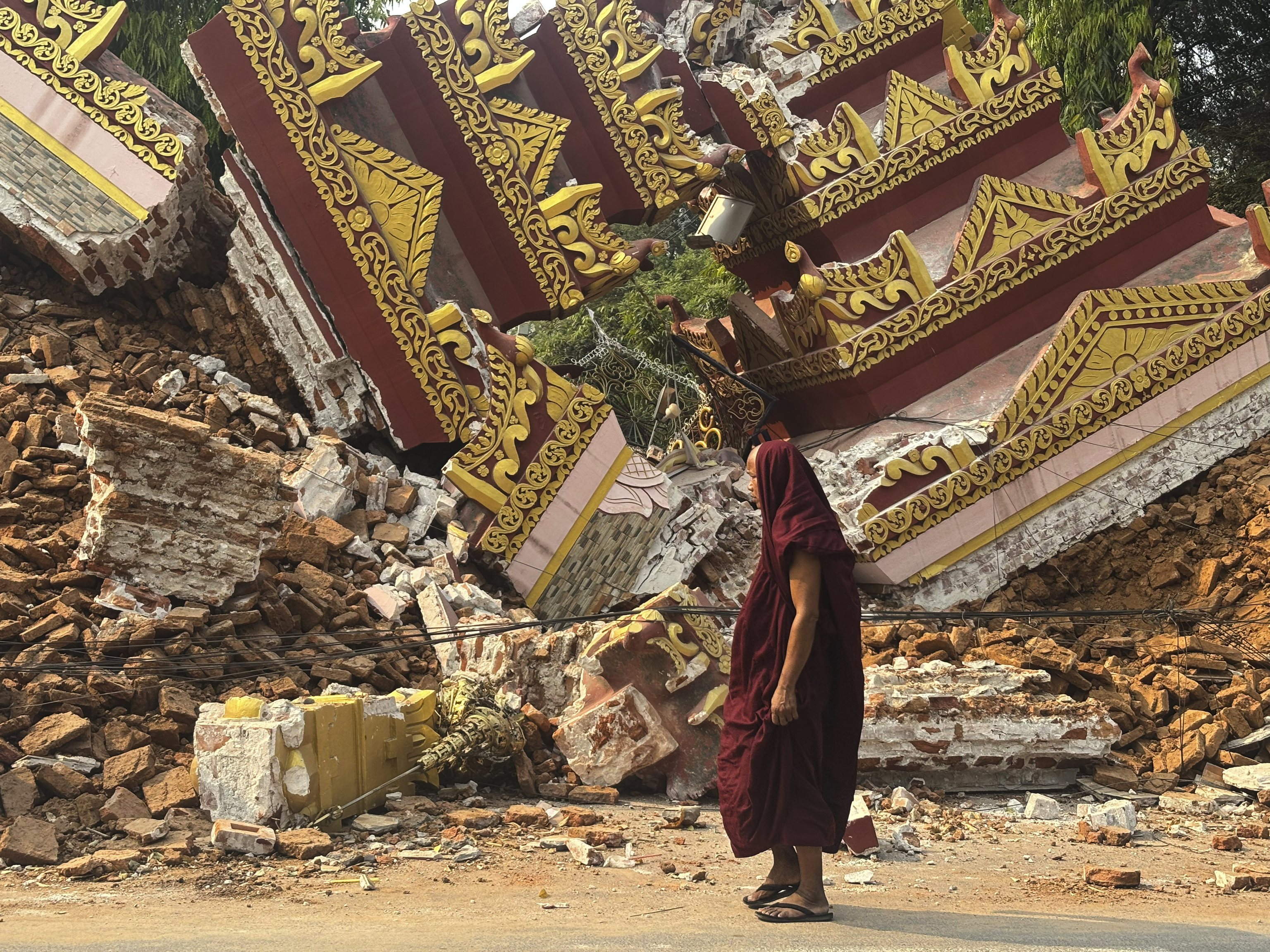Bangkok rises under a leaden sky that casts a halo of pessimism over the grief-stricken families, worn out by insomnia and anguish, waiting for news of the workers who have been trapped for over 72 hours under a mountain of seven floors of rubble and broken beams. Mr. Choun clings to a worn photograph of his son while keeping his eyes fixed on the excavators and rescue teams that continue a increasingly desperate search for survivors.
"My son, Taing, is buried down there, but we do not lose hope no matter how many hours pass", says Choun, a Cambodian migrant who arrived in the capital of Thailand five years ago with his family. There are more parents, many from Cambodia and Burma, spending hours murmuring prayers with the background noise of heavy machinery. They do so in a base camp with all kinds of provisions and tents with mats for rest. It is their sanctuary of waiting. And mourning. Psychological support is also provided.
The excavators have been removing the remains of the collapsed building for four nights since it fell last Friday at 13:40 with the jolt of the 7.7 magnitude earthquake that had its epicenter 1,000 kilometers away in neighboring Burma, where 2,719 deaths have been reported, according to Chinese State Television. Beneath the rubble in Bangkok, it is believed that 76 buried workers remain. They were caught under what was to be a 34-story office complex in the Chatuchak district. The State Audit Office, an anti-corruption agency, would have been housed here.
Like the families, local rescue teams, supported by search dogs and drones, also do not lose hope. They have been joined by some personnel from China and U.S. military. The last signs of life under the crushed steel beams and concrete blocks were reported on Sunday when body heat sensors detected vital signs of at least a dozen people. This raised spirits that were dashed when on Monday afternoon it was reported that, after a new scan with the sensors, no signs of life were found.
The rainwater that fell in the morning, mixing with dust to form a grayish mud that stuck to shoes, is hindering the rescue operation. Trucks continuously enter and exit to remove the debris cleared from the pile. Over the weekend, the heavy machinery would occasionally stop in the hope of hearing the cry of a survivor. They no longer do. "We have passed the crucial 72 hours to find people alive", says one of the rescue staff members.
In the latest official update, the death toll in the earthquake in the Thai capital has risen to 20, with 13 found in the mud of Chatuchak. Electrician Setnawet, who worked in the building, managed to escape the collapse because he was on the ground floor. "The whole structure started to creak, and I ran out," he recounts. Her husband, Nuguy, also an electrician, was not as lucky. He was working on the 23rd floor when the building collapsed. His wife, who does not leave the tent set up for the families' wait, a few meters from the collapse, still believes in a miracle.
Among those anxiously awaiting news of the missing is a young woman who has heard nothing from her brother, who worked on the 28th floor; a group of Burmese explains that they are waiting for about twenty compatriots they believe may be under the building's remains; another Thai girl says her uncles and two cousins are also buried there. The countdown is becoming more agonizing.
There is a lot of hustle and bustle of local and foreign journalists around the disaster area. Most are also covering the earthquake in Burma from Bangkok since the military regime ruling that country since the 2021 coup does not allow international press, so the on-site information is quite limited, considering the entrenched censorship imposed by the dictatorship and internet restrictions.
In Thailand, the focus remains on a collapsed building that had been under construction for three years, costing over 2 billion Thai baht (around 53 million euros). It was a joint project between the local company Italian-Thai Development PLC and China Railway Number, a subsidiary of the state giant China Railway Group, a key player in Beijing's mega infrastructure project in developing countries under the umbrella of the new Silk Road.
Thai authorities have announced they are investigating the Chinese contractor. Many engineers have been saying for days that something must have gone wrong because this construction site was the only one in Bangkok that collapsed after the earthquake. "I was able to save myself because a beam acted as a lever against the wall behind me for a few seconds, giving me time to run out," recounts one of the survivors, Theerathon Pannoy, who has not moved from the camp in all these days and is helping distribute food and water to the victims' families and rescue teams.
After inspecting the disaster site with a team of engineers, Industry Minister Akanat Promphan announced to the media that "some irregularities" had been observed in the types of steel used for construction, which may not meet the required standards for works of this magnitude. On Sunday, four Chinese citizens, photographed taking documents from a booth next to the collapsed building, were arrested. After questioning, the police identified them as workers from the Chinese company hired for the project.
At night, the excavators continue to remove debris. No one sleeps. Neither the rescue teams nor the families of the trapped workers. There is no rest. There is no time. And hope is dwindling.
